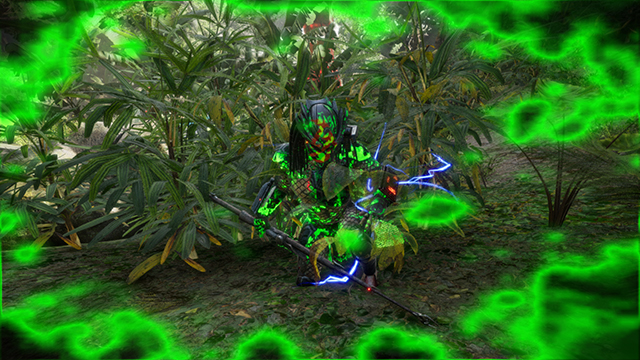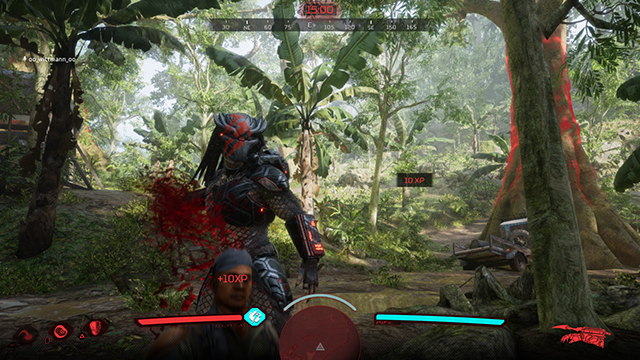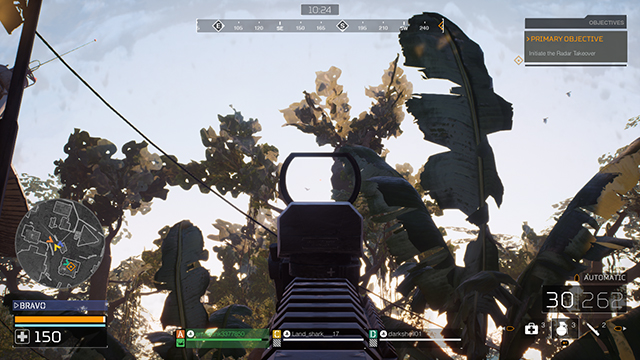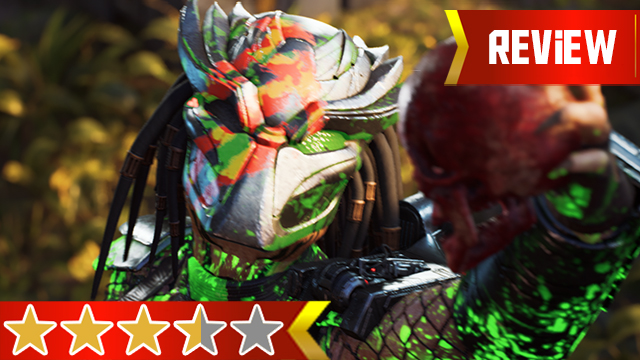The Predator’s trophy room is decorated with many skulls — humans, coyotes, Xenomorphs — but there is one foe that the dreaded beast can’t seem to best: time. Time has turned this predator into prey since the 1987 classic film, transforming an esteemed hunter into an atrophying pile of meat that doesn’t even deserve a mercy killing. A wealth of technical shortcomings and design flaws keep PREDATOR: HUNTING GROUNDS from being the stimpack of life the series needs, but it’s still got plenty of tense asymmetrical gameplay to make the hunt worthwhile.
The asymmetry is at the very core of Hunting Grounds. It pits four human soldiers against one Predator where the humans have to complete missions while being pursued by the lone alien. A large bucket of objectives keeps patterns from setting in and the looming threat of the Predator is a constant form of tension that’s not regularly seen in the online space.
ALSO: Get trophies in Predator: Hunting Grounds | How to get skull cosmetics
As a Fireteam member, the dynamic of having to nervously watch your back and scout the trees while focusing on your main objective naturally puts you in the shoes of the frightened characters of the first film. Paranoia sets in as you hear the Predator’s clicks and hisses and while the sound design doesn’t seem accurate enough to exactly pinpoint the monster’s location, the audio cues evoke the sense of fear that was integral to the 1987 movie (and poorly emulated after). The Fireteam’s powerful yet standard arsenal doesn’t mean you’re ineffective, but that’s just a testament to how stressful being hunted can be.
Eliciting that fear as the Predator is conceptually empowering as using deception and agility to pick off prey one by one is endlessly satisfying. Scampering around in the trees and knowing how to use your tools to strike takes more strategy and skill, especially since you can’t survive going head-on against four reasonably competent humans. Like the Assassin’s Creed multiplayer modes, that methodical, tactical pacing in the online multiplayer arena is rare and how Predator: Hunting Grounds uses its source material to organically create a unique and engaging gameplay loop.
Predator: Hunting Grounds Review | Falling prey to its failures

However, a lot of its successes are in the abstract as the game clumsily stumbles over itself and sometimes misses its mark. Hunting down humans is thrilling, but the Predator is hamstrung in a few key areas. While caveman-style tactics can sometimes be effective, the Predator takes some more thought to play as since it’s not a regular first-person shooter.
Yet, despite its unique premise, the game doesn’t walk players through its intricacies and instead forces them to go to sources outside the game for tips and proper tutorials. Weapon descriptions are vague, some vital tools are buried, and the absence of a practice room forces players to learn in the heat of the match if they understandably don’t want to load up a private match to experiment. Lacking tutorials for the Fireteam is one issue, but failing to properly prepare potential Predators is an even bigger one since there’s not much to truly compare this game to.
Ill-prepared hunters-in-training are at an even bigger disadvantage because of the leveling system. The game locks vital perks and weapons behind high ranks, which automatically puts rookie players at an even steeper disadvantage since they have to learn a new game on top of having weak gear. Leveled up Fireteam members get the minigun and a souped-up Predator has access to, well, everything while those starting out get stuck with a pea shooter and the most basic loadout. It’s unfair in the beginning to have such a meager set of tools and its boring later on as some earlier weapons become obsolete.
The game has a pretty sizable amount of cosmetics, too, so it’s even more puzzling that it opts to hide away gameplay modifiers as carrots that should just immediately be given to everyone. In addition to disproportionately stifling new players, hiding classes, guns, perks, and other weapons behind levels is artificially limiting since you can’t truly experiment with such a truncated loadout.
Predator: Hunting Grounds Review | A hamstrung Predator

The Predator suffers the most from this as it has a pathetic starting kit. And, when combined with the weak tutorials, it’s partially why that faction feels so underpowered. Even though the Yautja could and should see some more buffs, it also suffers from more than its share of design flaws and bugs.
The plasma cannon, granted you can get over the sluggish gadget switching interface, can be effective, but it often blows up right in front of you instead of actually going to where the lasers are pointing. Small items like twigs or lamps can obstruct it, too, which is infuriating since an all-powerful space laser should not lose to small greenery or office equipment. The former is particularly annoying since the game mostly takes place in the jungle.
Landing shots is overly difficult because of this (along with the inability to switch shoulders while aiming) and is even more problematic when scurrying around in the trees. The prompt to leap into the trees from the ground is too finicky, especially when under pressure, and strangely can’t be initiated mid-leap. This can ruin the flow and make an apex predator look like a goofy dude in a rubber suit as they casually fidget near the trunk trying to figure out how to scale it.
Predator: Hunting Grounds Review | A little buggy and a little ugly

Leaping can even wig out when done successfully and points out just some of the wealth of bugs in the game. Sometimes you’ll enter “tree walking” mode on the ground. Other times your leap won’t get you to where the marker says it will. You’ll get stuck in rocks or trees. Icon stay on the screen long after they are needed. Enemies will appear out of thin air or T-pose after they die. They’re meant to serve as distractions but they’re so stupid and glitchy that they don’t require much from the Fireteam, meaning that it’s just another thing the Predator has to overcome. Mishaps can hamper the humans, but most of them disproportionately affect the Predator especially as the game seems designed to directly reward the humans more often and make their jobs easier.
These hiccups and oversights happen frequently enough to pull you out and foreshadow the rest of the title’s subpar technical performance. The frame rate is fluid enough most of the time, but tends to take a dive when the Predator shows up. Dropped frames make it even harder to hit the slippery bastard and acts as sort of a cheap buff for the iconic hunter. And out of all the buffs that beast needs, a choppy frame rate is not one of them.
Its visuals are a little stronger as it, in conjunction with the moody, 1980s action movie soundtrack, captures the tone of the debut film quite well. However, its limitations are apparent and distracting. There is a heavy amount of shimmering as the trees in the distance look like they were rendered on a PS2. Some of them even pop in as you look up. It’s appears as though Illfonic wanted to have a gigantic jungle with a vast draw distance of thick greens, but couldn’t quite hit that benchmark. Instead, we got the disappointing half-measure of both: a big jungle that looks worse the more it goes on.
Much like a real hunt, Predator: Hunting Grounds rewards patience. Wading through the questionable technical performance and perplexing design gives persistent Predators a multiplayer experience that flourishes as its cat-and-mouse gameplay reveals itself like a newly uncloaked Yautja. Collecting four skulls with the spine intact is just as thrilling as taking down a cunning Predator. Yet each blunder and bug acts as another cut on the Predator’s torso, revealing that this monstrosity does, in fact, bleed. It’s just now up to Illfonic to issue some patches to prove that bleeding doesn’t necessarily mean something can be killed so easily.
GameRevolution reviewed Predator: Hunting Grounds on PS4 with a copy provided by the publisher.
-
Authentic Predator-esque presentation and soundtrack.
-
Tense “hunt or be hunted” gameplay.
-
Fireteam missions don’t often repeat.
-
Inconsistent visuals, a choppy frame rate, and glitches can hamper gameplay and generally be annoying.
-
Stupid, non-threatening AI and odd design choices put unfair roadblocks in front of the Predator.
-
Lackluster tutorials and locking better gear behind leveling can make it too difficult for newcomers.







